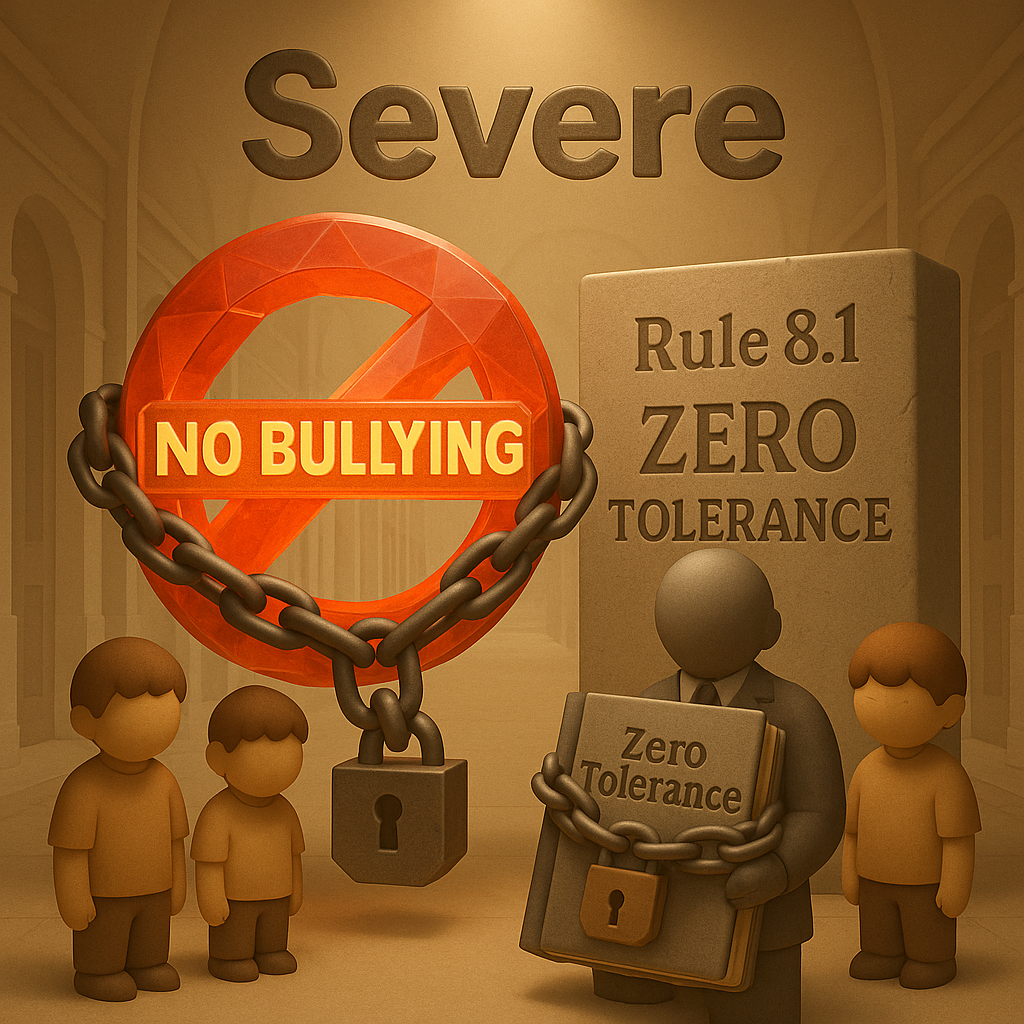Severe
Definition
The adjective "severe" describes something very serious, intense, or harsh in degree, effect, or character. It can also refer to strictness in judgment or discipline, or to a plain, unadorned style.
Parts of Speech
- Adjective
Pronunciation
American English
- IPA Pronunciation: /səˈvɪr/
- Respelling: sə‑VEER
British English
- IPA Pronunciation: /sɪˈvɪə/
- Respelling: si‑VEER
Etymology
"Severe" entered Middle English in the late 14th century from Old French severe, ultimately from Latin severus “grave, serious, strict.”
Derivatives
- Severity (noun)
- Severely (adverb)
- Severeness (noun)
- Severest (superlative form)
- Severer (comparative form)
Synonyms
- Serious
- Acute
- Grave
- Harsh
- Stern
Antonyms
- Mild
- Gentle
- Lenient
- Moderate
- Light
Usage
"Severe" is frequent in medical, meteorological, disciplinary, and aesthetic contexts. Examples: "She suffered a severe allergic reaction," "The region experienced severe thunderstorms," and "The judge imposed a severe sentence."
Related Terms
- Intensity: The quality of being extreme in strength or degree.
- Rigour: Strictness or exactness.
- Austerity: Plainness and lack of decoration.
Detailed Definitions
Adjective
- Very serious or intense in degree: Refers to conditions, damage, or pain that are extreme.
- Example: "The storm caused severe flooding across the county."
- Harsh or stern in manner or punishment: Describes strict behavior or uncompromising penalties.
- Example: "The school has severe rules against bullying."
- Plain, austere, or lacking ornamentation (style): Indicates a minimalist or unembellished appearance.
- Example: "The building’s severe façade reflects modernist ideals."
- Demanding great effort or ability: Highlights tasks or tests that are difficult or taxing.
- Example: "Mountaineers face severe physical challenges at high altitude."
- Rigidly exact or precise: Emphasizes uncompromising adherence to standards.
- Example: "The analysis underwent severe scrutiny before publication."
severe



🇨🇳 Mandarin
- 严重 (Yánzhòng) - severe, serious
- IPA: [jɛn.ʈʂʊŋ]
- Respelling: yan-zhong
- 严厉 (Yánlì) - strict, severe
- IPA: [jɛn.li]
- Respelling: yan-li
🇮🇳 Hindi
- गंभीर (Gambhīr) - serious, severe
- IPA: [gəmbʱiːr]
- Respelling: gam-bheer
- कठोर (Kaṭhora) - hard, severe
- IPA: [kəʈʰor]
- Respelling: ka-thor
🇪🇸 Spanish
- Severo - severe
- IPA: [seˈβeɾo]
- Respelling: se-ve-ro
- Grave - serious, severe
- IPA: [ˈɡɾaβe]
- Respelling: gra-ve
🇫🇷 French
- Sévère - severe
- IPA: [sevɛʁ]
- Respelling: se-vair
- Grave - serious, severe
- IPA: [ɡʁav]
- Respelling: grav
🇦🇪 Modern Standard Arabic
- شديد (Shadīd) - severe, intense
- IPA: [ʃæˈdiːd]
- Respelling: sha-deed
- خطير (Khateer) - serious, severe
- IPA: [xaˈtiːr]
- Respelling: kha-teer
🇧🇩 Bengali
- তীব্র (Tībra) - severe, intense
- IPA: [tibro]
- Respelling: ti-bro
- কঠোর (Kaṭhōr) - hard, severe
- IPA: [kɔʈʰor]
- Respelling: ko-thor
🇷🇺 Russian
- Серьезный (Ser'yeznyy) - serious, severe
- IPA: [sʲɪˈrʲjesnɨj]
- Respelling: si-ryes-nyi
- Строгий (Strogiy) - strict, severe
- IPA: [stroɡʲɪj]
- Respelling: stro-giy
🇵🇹 Portuguese
- Severo - severe
- IPA: [sɨˈveɾu]
- Respelling: se-ve-ru
- Grave - serious, severe
- IPA: [ˈɡɾavɨ]
- Respelling: gra-ve
🇮🇩 Indonesian
- Parah - severe
- IPA: [parah]
- Respelling: pa-rah
- Berat - heavy, severe
- IPA: [bə'rat]
- Respelling: be-rat
🇩🇪 German
- Schwer - heavy, severe
- IPA: [ʃveːɐ̯]
- Respelling: shvear
- Streng - strict, severe
- IPA: [ʃtʁɛŋk]
- Respelling: shtrenk
🇯🇵 Japanese
- 厳しい (Kibishii) - strict, severe
- IPA: [kʲibʲiɕiː]
- Respelling: ki-bi-shii
- 重い (Omoi) - heavy, severe
- IPA: [omo.i]
- Respelling: o-moi
🇻🇳 Vietnamese
- Nghiêm trọng - serious, severe
- IPA: [ŋiəˀm ʈâːwŋ˧ˀ˨ʔ]
- Respelling: nghiem trong
- Khắc nghiệt - harsh, severe
- IPA: [kʰak ŋiəp˧˥]
- Respelling: khac nghiet
🇰🇷 Korean
- 심각한 (Sim-gag-han) - serious, severe
- IPA: [ɕim.ɡa̠.ɡʰan]
- Respelling: shim-ga-ghan
- 엄격한 (Eom-gyeok-han) - strict, severe
- IPA: [ʌm.ɡʲʌ.kʰan]
- Respelling: um-gyuk-han
🇹🇷 Turkish
- Şiddetli - severe, violent
- IPA: [ʃidːetli]
- Respelling: shid-det-li
- Ciddi - serious, severe
- IPA: [d͡ʒidːi]
- Respelling: ji-di
🇵🇰 Urdu
- سخت (Sakht) - hard, severe
- IPA: [səkʰt̪]
- Respelling: sakht
- شدید (Shadid) - intense, severe
- IPA: [ʃədiːd]
- Respelling: sha-deed





